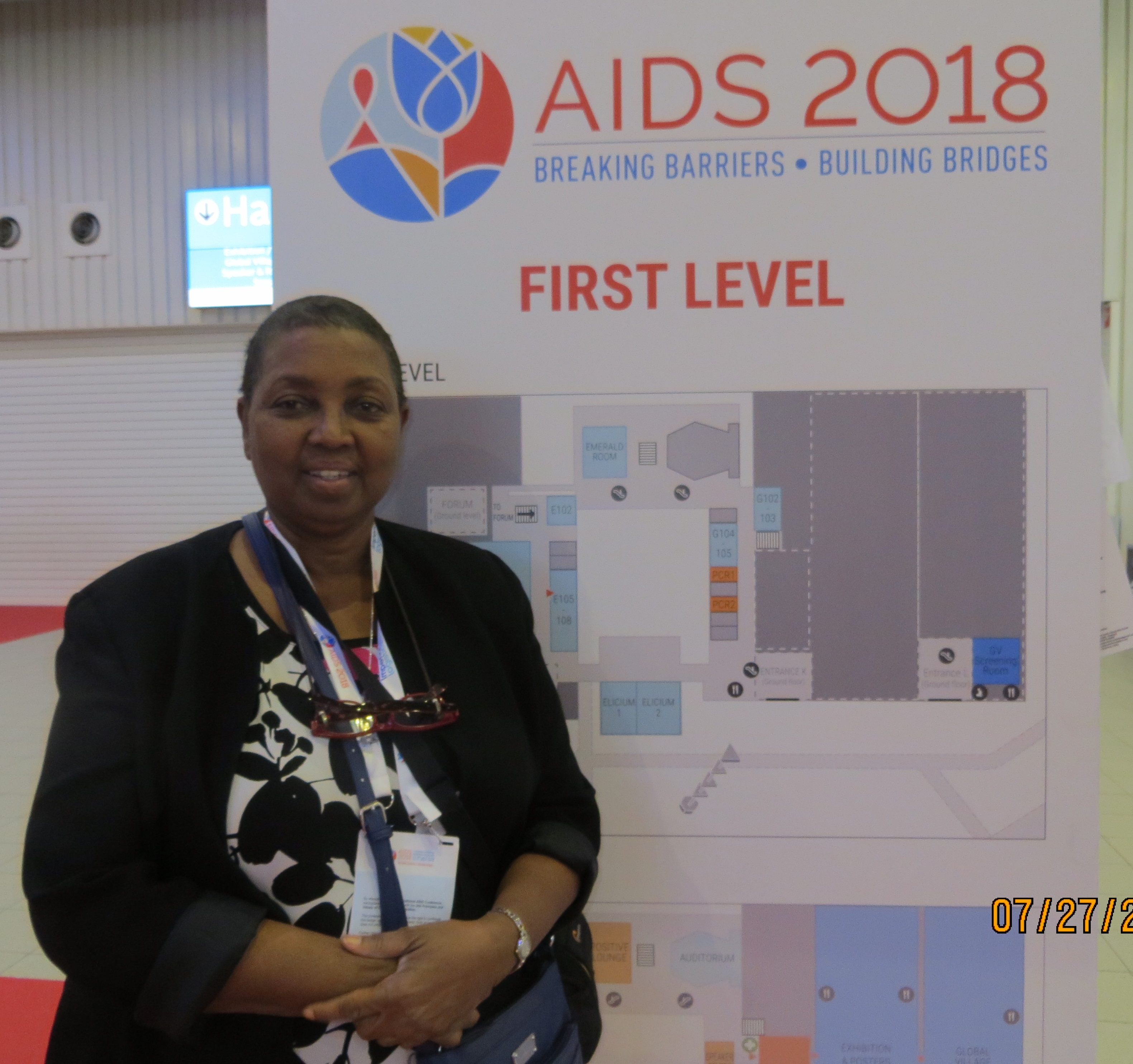
Caribbean voices from AIDS 2018Ms. Wendy Kitson-Piggott shares her amazing experience at the 22nd International AIDS Conference.
Laboratory and Quality Systems Specialist at the Caribbean Med Labs Foundation (CMLF), Ms. Wendy Kitson-Piggott attended the 22nd International AIDS Conference, 23 – 27 July, as a self-sponsored delegate. The Trinidad-based microbiologist has participated in several of the International AIDS Conferences since 1992 after assuming the regional laboratory advisory function for the Special Programme on Sexually Transmitted Infections (SPSTI) at the Caribbean Epidemiology Centre (CAREC).
Speaking to the editor of the PANCAP Newsletter, Wendy shared that her consistent attendance has been quite rewarding. She highlighted that the discussions, decisions and advocacy shared at the global event have resulted in significant actions and responses in the Caribbean aimed at the prevention and control of the HIV epidemic. These have ranged from innovations in lab diagnostic technology, which improved timeliness and reliability to significant cost reductions and access to antiretroviral medication (ARVs).
Wendy believes that it is important for Caribbean professionals in related STI and HIV professions engaged in the response to make a personal effort to continue to participate and influence the ongoing debates about effective and relevant approaches to HIV control and prevention.
AIDS 2018 provided a vast landscape of activities, panel discussions and presentations on innovations in the Global HIV response. However, it was important for Wendy to secure her spot at events that provided a wealth of knowledge on the continuum of care for the 90-90-90 Targets. She attended sessions that presented new knowledge on innovative and cost-effective approaches to scaling up HIV testing including experiences with and effectiveness of self-testing across the globe, the future of CD4 and viral load testing and the continuing importance of timely testing and diagnosis of Opportunistic Infections (OIs) and Sexually Transmitted Infections (STIs). She was also exposed to sessions on the acceptability and feasibility of ‘Treat all’ as well as Pre-exposure prophylaxis (PrEP) in resource-limited environments.
Wendy was also grateful for the experience since it provided critical updates for the role of laboratories in the HIV response. There were sessions that provided critical data that can aid the Caribbean region’s ability to apply global experiences and evidence to review and improve current lab approaches, programmes and services that support the achievement of treatment cascade targets.
At the culmination of AIDS 2018, Wendy does not regret her investment in attending, she stated, “I look forward to the application of innovative, relevant and cost-effective strategies to expand and improve testing support across the region for every step in the treatment cascade. I hope that professionals from all of the relevant disciplines who attended this conference – lab, clinical, behavioural, economic etc. – return and aggressively and collectively advocate for the region to take ultimate responsibility for the sustainability of efforts and capacities if we are to end AIDS by 2030”.
###
WHAT IS PANCAP?
PANCAP is a Caribbean regional partnership of governments, regional civil society organisations, regional institutions and organisations, bilateral and multilateral agencies and contributing donor partners established on 14 February 2001. PANCAP provides a structured and unified approach to the Caribbean’s response to the HIV epidemic, and coordinates the response through the Caribbean Regional Strategic Framework on HIV and AIDS to maximise efficient use of resources and increase impact, mobilise resources and build the capacity of partners.
What are the Global AIDS Strategy 2021–2026 targets and commitments?
If targets and commitments in the strategy are achieved:
- The number of people who newly acquire HIV will decrease from 1.7 million in 2019 to less than 370 000 by 2025
- The number of people dying from AIDS-related illnesses will decrease from 690 000 in 2019 to less than 250 000 in 2025.
- The goal of eliminating new HIV infections among children will see the number of new HIV infections drop from 150,000 in 2019 to less than 22,000 in 2025.
What are the 95-95-95 Targets for ending AIDS?
- 95% of People Living with HIV know their HIV status;
- 95% of people who know their status on treatment; and
- 95% of people on treatment with suppressed viral loads.
HELPFUL LINKS:
Global AIDS Strategy 2021–2026, End Inequalities, End AIDS
https://pancap.org/pancap-documents/global-aids-strategy-2021-2026-end-inequalities-end-aids/
Caribbean Regional Strategic Framework on HIV and AIDS (CRSF) 2019-2025
https://pancap.org/pancap-documents/caribbean-regional-strategic-framework-2019-2025/
